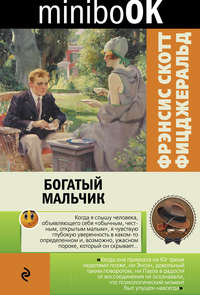
Полная версия
Сборник лучших произведений американской классической литературы. Уровень 4
“Looks very good,” he remarked vaguely.
I took him into the pantry where he looked a little reproachfully at the Finn. Together we scrutinized the twelve lemon cakes from the delicatessen shop.
“Will they do?” I asked.
“Of course, of course! They're fine!” and he added hollowly, “…old sport.”
“Nobody's coming to tea. It's too late!” He looked at his watch as if there was some pressing demand on his time elsewhere. “I can't wait all day.”
“Don't be silly; it's just two minutes to four.”
He sat down, miserably, as if I had pushed him, and simultaneously there was the sound of a motor turning into my lane. We both jumped up and, a little harrowed myself, I went out into the yard.
Under the dripping bare lilac trees a large open car was coming up the drive. It stopped. Daisy's face, tipped sideways beneath a three-cornered lavender hat, looked out at me with a bright ecstatic smile.
“Is this absolutely where you live, my dearest one?”
The exhilarating ripple of her voice was a wild tonic in the rain. I had to follow the sound of it for a moment, up and down, with my ear alone before any words came through. A damp streak of hair lay like a dash of blue paint across her cheek and her hand was wet with glistening drops as I took it to help her from the car.
“Are you in love with me,” she said low in my ear. “Or why did I have to come alone?”
“That's the secret of Castle Rackrent. Tell your chauffeur to go far away and spend an hour.”
We went in. To my overwhelming surprise the living room was deserted.
“Well, that's funny!” I exclaimed.
“What's funny?”
She turned her head as there was a light, dignified knocking at the front door. I went out and opened it. Gatsby, pale as death, with his hands plunged like weights in his coat pockets, was standing in a puddle of water glaring tragically into my eyes.
With his hands still in his coat pockets he stalked by me into the hall, turned sharply as if he were on a wire and disappeared into the living room. It wasn't a bit funny. Aware of the loud beating of my own heart I pulled the door to against the increasing rain.
For half a minute there wasn't a sound. Then from the living room I heard a sort of choking murmur and part of a laugh followed by Daisy's voice on a clear artificial note.
“I certainly am awfully glad to see you again.”
“We haven't met for many years,” said Daisy, her voice as matter-of-fact as it could ever be.
“Five years next November.”
The automatic quality of Gatsby's answer set us all back at least another minute. I had them both on their feet with the desperate suggestion that they help me make tea in the kitchen when the demoniac Finn brought it in on a tray.
Amid the welcome confusion of cups and cakes a certain physical decency established itself. Gatsby got himself into a shadow and while Daisy and I talked looked conscientiously from one to the other of us with tense unhappy eyes. However, as calmness wasn't an end in itself I made an excuse at the first possible moment and got to my feet.
“Where are you going?” demanded Gatsby in immediate alarm.
“I'll be back.”
“I've got to speak to you about something before you go.”
He followed me wildly into the kitchen, closed the door and whispered: “Oh, God!” in a miserable way.
“What's the matter?”
“This is a terrible mistake,” he said, shaking his head from side to side, “a terrible, terrible mistake.”
“You're just embarrassed, that's all,” and luckily I added, “Daisy's embarrassed too.”
“She's embarrassed?” he repeated incredulously.
“Just as much as you are.”
“Don't talk so loud.”
“You're acting like a little boy,” I broke out impatiently. “Not only that but you're rude. Daisy's sitting in there all alone.”
He raised his hand to stop my words, looked at me with unforgettable reproach and opening the door cautiously went back into the other room.
I went in – after making every possible noise in the kitchen short of pushing over the stove – but I don't believe they heard a sound. They were sitting at either end of the couch looking at each other as if some question had been asked or was in the air, and every vestige of embarrassment was gone. Daisy's face was smeared with tears and when I came in she jumped up and began wiping at it with her handkerchief before a mirror. But there was a change in Gatsby that was simply confounding. He literally glowed; without a word or a gesture of exultation a new well-being radiated from him and filled the little room.
“Oh, hello, old sport,” he said, as if he hadn't seen me for years. I thought for a moment he was going to shake hands.
“I want you and Daisy to come over to my house,” he said, “I'd like to show her around.”
“You're sure you want me to come?”
“Absolutely, old sport.”
Daisy went upstairs to wash her face – too late I thought with humiliation of my towels – while Gatsby and I waited on the lawn.
“My house looks well, doesn't it?” he demanded. “See how the whole front of it catches the light.”
I agreed that it was splendid.
“Yes.” His eyes went over it, every arched door and square tower. “It took me just three years to earn the money that bought it.”
“I thought you inherited your money.”
“I did, old sport,” he said automatically, “but I lost most of it in the big panic – the panic of the war.”
I think he hardly knew what he was saying, for when I asked him what business he was in he answered “That's my affair,” before he realized that it wasn't the appropriate reply.
“Oh, I've been in several things[45],” he corrected himself. “I was in the drug business and then I was in the oil business. But I'm not in either one now.”
Before I could answer, Daisy came out of the house and two rows of brass buttons on her dress gleamed in the sunlight.
“That huge place THERE?” she cried pointing.
“Do you like it?”
“I love it, but I don't see how you live there all alone.”
“I keep it always full of interesting people, night and day. People who do interesting things. Celebrated people.”
Daisy admired everything: the house, the gardens, the beach.
He hadn't once ceased looking at Daisy and I think he revalued everything in his house according to the measure of response it drew from her well-loved eyes. Sometimes, too, he stared around at his possessions in a dazed way as though in her actual and astounding presence none of it was any longer real. Once he nearly toppled down a flight of stairs.
His bedroom was the simplest room of all – except where the dresser was garnished with a toilet set of pure dull gold. Daisy took the brush with delight and smoothed her hair, whereupon Gatsby sat down and shaded his eyes and began to laugh.
Recovering himself in a minute he opened for us two hulking patent cabinets which held his massed suits and dressing-gowns and ties, and his shirts, piled like bricks in stacks a dozen high.
“I've got a man in England who buys me clothes. He sends over a selection of things at the beginning of each season, spring and fall.”
He took out a pile of shirts and began throwing them, one by one before us, shirts of sheer linen and thick silk and fine flannel which lost their folds as they fell and covered the table in many-colored disarray. While we admired he brought more and the soft rich heap mounted higher – shirts with stripes and scrolls and plaids in coral and apple-green and lavender and faint orange with monograms of Indian blue. Suddenly with a strained sound, Daisy bent her head into the shirts and began to cry stormily.
“They're such beautiful shirts,” she sobbed, her voice muffled in the thick folds. “It makes me sad because I've never seen such – such beautiful shirts before.”
Daisy put her arm through his abruptly. I began to walk about the room, examining various objects. A large photograph of an elderly man in yachting costume attracted me, hung on the wall over his desk.
“Who's this?”
“That's Mr. Dan Cody[46], old sport. He's dead now. He used to be my best friend years ago.”
There was a small picture of Gatsby, also in yachting costume – taken apparently when he was about eighteen.
“I adore it!” exclaimed Daisy.
After the house, we were to see the grounds and the swimming pool, and the hydroplane and the midsummer flowers – but outside Gatsby's window it began to rain again so we stood in a row looking at the corrugated surface of the Sound.
Almost five years! His hand took hold of hers and as she said something low in his ear he turned toward her with a rush of emotion. They had forgotten me, Gatsby didn't know me now at all. I looked once more at them and went out of the room, leaving them there together.
Chapter 6
James Gatz[47] – that was his name. He had changed it at the age of seventeen and at the specific moment – when he saw Dan Cody's yacht. It was James Gatz who had been loafing along the beach that afternoon, but it was already Jay Gatsby who borrowed a row-boat and informed Cody that a wind might catch him and break him up in half an hour.
His parents were unsuccessful farm people – his imagination had never really accepted them as his parents at all. So he invented Jay Gatsby, and to this conception he was faithful to the end.
Dan Cody was fifty years old then, he was a millionaire, and an infinite number of women tried to separate him from his money. To the young Gatz the yacht represented all the beauty and glamour in the world. Cody asked him a few questions and found that he was clever, and extravagantly ambitious. A few days later he bought him a blue coat, six pairs of white trousers and a yachting cap.
He was employed as a steward, skipper, and secretary. The arrangement lasted five years during which the boat went three times around the continent. In Boston Dan Cody died.
He told me all this very much later.
For several weeks I didn't see him or hear his voice on the phone. But finally I went over to his house one Sunday afternoon. I hadn't been there two minutes[48] when somebody brought Tom Buchanan in for a drink.
“I'm delighted to see you,” said Gatsby. “Sit right down. Have a cigarette or a cigar.” He walked around the room quickly, ringing bells. “I'll have something to drink for you in just a minute.”
He was profoundly affected by the fact that Tom was there.
“I believe we've met somewhere before, Mr. Buchanan. I know your wife,” continued Gatsby.
“That so?[49]“
Tom turned to me.
“You live near here, Nick?”
“Next door.”
“That so?”
Tom was evidently perturbed at Daisy's running around alone, for on the following Saturday night he came with her to Gatsby's party. Daisy's voice was playing murmurous tricks in her throat.
“These things excite me SO,” she whispered.
“Look around,” suggested Gatsby. “You must see the faces of many people you've heard about.”
Daisy and Gatsby danced. I remember being surprised[50] by his graceful, conservative fox-trot – I had never seen him dance[51] before. Then they came to my house and sat on the steps for half an hour while at her request I remained watchfully in the garden.
The party was over. I sat on the front steps with them while they waited for their car. It was dark here in front of the house.
“Who is this Gatsby anyhow?” demanded Tom suddenly. “Some big bootlegger?”
“Where'd you hear that?” I inquired.
“I didn't hear it. I imagined it. A lot of these newly rich people are just big bootleggers, you know.”
“Not Gatsby,” I said shortly.
He was silent for a moment.
“I'd like to know who he is and what he does,” insisted Tom. “And I think I'll make a point of finding out[52].”
“I can tell you right now,” answered Daisy. “He owned some drug stores, a lot of drug stores. He built them up himself.”
The dilatory limousine came rolling up the drive.
“Good night, Nick,” said Daisy.
Gatsby was silent.
“I feel far away from her,” he said.
He wanted nothing less of Daisy than that she should go to Tom and say, “I never loved you.”
“You can't repeat the past.”
“Can't repeat the past?” he cried incredulously. “Why of course[53] you can!”
He looked around him wildly, as if the past were lurking here in the shadow of his house.
“I'm going to fix everything just the way it was before,” he said, nodding determinedly.
Chapter 7
It was when curiosity about Gatsby was at its highest that the lights in his house failed to go on one Saturday night – and, as obscurely as it had begun, his career as Trimalchio[54] was over.
Only gradually did I become aware that the automobiles which turned expectantly into his drive stayed for just a minute and then drove sulkily away. Wondering if he were sick I went over to find out – an unfamiliar butler with a villainous face squinted at me suspiciously from the door.
“Is Mr. Gatsby sick?”
“Nope.” After a pause he added “sir” in a dilatory, grudging way.
“I hadn't seen him around, and I was rather worried. Tell him Mr. Carraway came over.”
“Who?” he demanded rudely.
“Carraway.”
“Carraway. All right, I'll tell him.” Abruptly he slammed the door.
My Finn informed me that Gatsby had dismissed every servant in his house a week ago and replaced them with half a dozen others, who never went into West Egg Village to be bribed by the tradesmen, but ordered moderate supplies over the telephone. The grocery boy reported that the kitchen looked like a pigsty, and the general opinion in the village was that the new people weren't servants at all.
Next day Gatsby called me on the phone.
“Going away?” I inquired.
“No, old sport.”
“I hear you fired all your servants.”
“I wanted somebody who wouldn't gossip. Daisy comes over quite often – in the afternoons.”
He was calling up at Daisy's request – would I come to lunch at her house tomorrow? Miss Baker would be there. Half an hour later Daisy herself telephoned and seemed relieved to find that I was coming. I couldn't believe that they would choose this occasion for a scene[55].
The next day I stood before the Buchanans' house.
“Madame expects you in the salon!” cried the servant.
Gatsby stood in the center of the crimson carpet and gazed around with fascinated eyes. Daisy watched him and laughed, her sweet, exciting laugh.
We were silent. Tom opened the door, blocked out its space for a moment with his thick body, and hurried into the room.
“Mr. Gatsby! I'm glad to see you, sir… Nick…”
“Make us a cold drink,” cried Daisy.
As he left the room again she got up and went over to Gatsby and pulled his face down kissing him on the mouth.
“You know I love you,” she murmured. “I don't care!”
Daisy sat back upon the couch.
“It's so hot,” said Daisy. “Let's all go to town! Who wants to go to town?”
“Let's go! Come on, come on!” said Tom.
“I can't say anything in his house, old sport,” said Gatsby to me. “Her voice is full of money,” he said suddenly.
That was it. I'd never understood before. It was full of money.
“Shall we all go in my car?” suggested Gatsby.
“Well, you take mine and let me drive your car to town,” offered Tom.
“I don't think there's much gas,” said Gatsby.
Daisy walked close to Gatsby, touching his coat with her hand. Jordan and Tom and I got into the front seat of Gatsby's car.
“You think I'm pretty dumb, don't you?” suggested Tom. “Perhaps I am, but I have a – almost a second sight, sometimes. I've made a small investigation of this fellow,” he continued. “I'd been making a small investigation of his past.”
“And you found he was an Oxford man,” said Jordan helpfully.
“An Oxford man!” He was incredulous. “Like hell he is![56]”
“Listen, Tom. Why did you invite him to lunch?” demanded Jordan.
“Daisy invited him; she knew him before we were married!”
The car began to make strange sounds. I remembered Gatsby's caution about gasoline.
“There's a garage right here,” objected Jordan.
Tom threw on both brakes impatiently and we came to a dusty stop under Wilson's sign.
“Let's have some gas!” cried Tom roughly. “What do you think we stopped for – to admire the view?”
“I'm sick,” said Wilson without moving. “I've been sick all day.”
“Well, shall I help myself?” Tom demanded.
With an effort Wilson left the shade and unscrewed the cap of the tank. In the sunlight his face was green.
“I've been here too long. I want to get away. My wife and I want to go west.”
“Your wife does!” exclaimed Tom.
“She's been talking about it for ten years. I'm going to get her away. I learned something,” remarked Wilson. “That's why I want to get away.”
Tom was feeling the hot whips of panic. His wife and his mistress were slipping from his control.
“You follow me to the south side of Central Park, in front of the Plaza,” said he.
Several times he turned his head and looked back for their car. I think he was afraid they would dart down a side street and out of his life forever.
We all decided to take the suite in the Plaza Hotel.
The room was large and stifling. Daisy went to the mirror and stood with her back to us, fixing her hair.
“It's a great suite,” whispered Jordan respectfully and every one laughed.
“Open another window,” commanded Daisy, without turning around.
“The thing to do is to forget about the heat,” said Tom impatiently. “You make it ten times worse by crabbing about it.”
He unrolled the bottle of whiskey from the towel and put it on the table.
“Why not let her alone, old sport?” remarked Gatsby. “You're the one that wanted to come to town.”
There was a moment of silence.
“Where'd you pick that up – this 'old sport'?”
“Now see here, Tom,” said Daisy, turning around from the mirror, “if you're going to make personal remarks I won't stay here a minute.”
“By the way, Mr. Gatsby, I understand you're an Oxford man.”
“Not exactly.”
“Oh, yes. It was in nineteen-nineteen, I only stayed five months. That's why I can't really call myself an Oxford man.”
Daisy rose, smiling faintly, and went to the table.
“Open the whiskey, Tom,” she ordered. “Then you won't seem so stupid to yourself.”
“Wait a minute,” said Tom, “I want to said Mr. Gatsby some words.”
“Go on,” Gatsby said politely.
“I suppose the latest thing is to sit back and let Mr. Nobody from Nowhere[57] make love to your wife!” “I know I'm not very popular. I don't give big parties.”
Angry as I was[58], I was tempted to laugh whenever he opened his mouth.
“I've got something to tell YOU, old sport, – ” began Gatsby. But Daisy interrupted helplessly.
“Please don't! Please let's all go home. Why don't we all go home?”
“That's a good idea.” I got up. “Come on, Tom. Nobody wants a drink.”
“I want to know what Mr. Gatsby has to tell me.”
“Your wife doesn't love you,” said Gatsby. “She's never loved you. She loves me.”
“You must be crazy!” exclaimed Tom automatically.
Gatsby sprang to his feet, vivid with excitement.
“She never loved you, do you hear?” he cried. “She only married you because I was poor and she was tired of waiting for me. It was a terrible mistake, but in her heart she never loved any one except me!”
At this point Jordan and I tried to go but Tom and Gatsby insisted with competitive firmness that we remain – as though neither of them had anything to conceal and it would be a privilege to partake vicariously of their emotions.
“Sit down, Daisy.” Tom's voice groped unsuccessfully for the paternal note. “What's been going on? I want to hear all about it.”
“I told you what's going on,” said Gatsby. “Going on for five years – and you didn't know.”
Tom turned to Daisy sharply.
“You've been seeing this fellow[59] for five years?”
“Not seeing,” said Gatsby. “No, we couldn't meet. But both of us loved each other all that time, old sport, and you didn't know. I used to laugh sometimes – ” but there was no laughter in his eyes, “to think that you didn't know.”
“Oh – that's all.” Tom tapped his thick fingers together like a clergyman and leaned back in his chair.
“You're crazy!” he exploded. “I can't speak about what happened five years ago, because I didn't know Daisy then – and I'll be damned if I see how you got within a mile of her unless you brought the groceries to the back door. But all the rest of that's a God Damned lie. Daisy loved me when she married me and she loves me now.”
“No,” said Gatsby, shaking his head.
“She does, though. The trouble is that sometimes she gets foolish ideas in her head and doesn't know what she's doing.” He nodded sagely. “And what's more, I love Daisy too. Once in a while I go off on a spree and make a fool of myself, but I always come back, and in my heart I love her all the time.”
“You're revolting,” said Daisy. She turned to me, and her voice, dropping an octave lower, filled the room with thrilling scorn: “Do you know why we left Chicago? I'm surprised that they didn't treat you to the story of that little spree.”
Gatsby walked over and stood beside her.
“Daisy, that's all over now,” he said earnestly. “It doesn't matter any more. Just tell him the truth – that you never loved him – and it's all wiped out forever.”
She looked at him blindly. “Why, – how could I love him – possibly?”
“You never loved him.”
She hesitated. Her eyes fell on Jordan and me with a sort of appeal, as though she realized at last what she was doing – and as though she had never, all along, intended doing anything at all. But it was done now. It was too late.
“I never loved him,” she said, with perceptible reluctance.
“Not that day I carried you down from the Punch Bowl to keep your shoes dry?” There was a husky tenderness in his tone. “…Daisy?”
“Please don't.” Her voice was cold, but the rancour was gone from it. She looked at Gatsby. “There, Jay,” she said – but her hand as she tried to light a cigarette was trembling. Suddenly she threw the cigarette and the burning match on the carpet.
“Oh, you want too much!” she cried to Gatsby. “I love you now – isn't that enough? I can't help what's past.” She began to sob helplessly. “I did love him once – but I loved you too.”
Gatsby's eyes opened and closed.
“You loved me TOO?” he repeated.
“Even that's a lie,” said Tom savagely. “She didn't know you were alive. Why, – there're things between Daisy and me that you'll never know, things that neither of us can ever forget.”
The words seemed to bite physically into Gatsby.
“I want to speak to Daisy alone,” he insisted. “She's all excited now – ”
“Even alone I can't say I never loved Tom,” she admitted in a pitiful voice. “It wouldn't be true.”
“Of course it wouldn't,” agreed Tom.
She turned to her husband.
“As if it mattered to you,” she said.
“Of course it matters. I'm going to take better care of you from now on.”
“You don't understand,” said Gatsby, with a touch of panic. “You're not going to take care of her any more.”
“I'm not?” Tom opened his eyes wide and laughed. He could afford to control himself now. “Why's that?”
“Daisy's leaving you.”
“Nonsense.”
“I am, though,” she said with a visible effort.
“She's not leaving me!” Tom's words suddenly leaned down over Gatsby.
“Certainly not for a common swindler who'd have to steal the ring he put on her finger.”
“I won't stand this!” cried Daisy. “Oh, please let's get out.”
“Who are you, anyhow?” broke out Tom. “I've made a little investigation into your affairs. I found out what your 'drug stores' were.” He turned to us and spoke rapidly. “He sold alcohol over the counter.”
“What about it[60], old sport?” said Gatsby politely.
“Don't you call me 'old sport'!” cried Tom.
I glanced at Daisy who was staring terrified between Gatsby and her husband and at Jordan who had begun to balance an invisible but absorbing object on the tip of her chin. Then I turned back to Gatsby – and was startled at his expression. He looked – and this is said in all contempt for the babbled slander of his garden – as if he had “killed a man.” For a moment the set of his face could be described in just that fantastic way.














